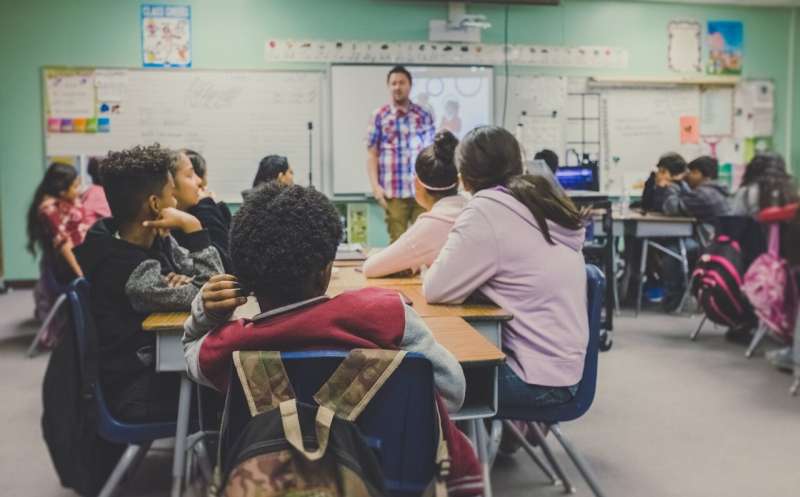Science
Researchers Advocate for Conversational Learning as AI Advances

Generative artificial intelligence is prompting a significant shift in educational approaches, according to researchers from the University of Cambridge. In a conceptual paper published on November 17, 2025, in the British Journal of Educational Technology, the authors call for a greater emphasis on “dialogic” learning, which prioritizes conversation and collaboration over traditional memorization methods.
The paper argues that the rise of AI technologies, including chatbots, challenges conventional education models that focus on absorbing and recalling information. Rupert Wegerif, a professor of education at the University of Cambridge, and Dr. Imogen Casebourne, a researcher at the Digital Education Futures Initiative, highlight the need for educators and policymakers to rethink teaching strategies in light of these advancements.
In conventional science lessons, students often learn key principles and formulas, expected to memorize and reproduce them during assessments. The paper suggests a reimagined approach, starting with open-ended questions like, “Why do objects fall to the ground?” This format encourages group discussions where students can explore their ideas collaboratively. They might then engage with an AI chatbot that simulates the perspectives of historical figures such as Aristotle, Newton, and Einstein, enhancing their understanding through dialogue.
Wegerif emphasizes that the advent of AI serves as a critical moment for education, likening it to past technological shifts involving the internet and blackboards. He asserts, “If ChatGPT can pass the exams we use to assess students, then at the very least we ought to be thinking deeply about what we are preparing them for.” He advocates for an educational model that fosters conversation and collaboration, echoing the Socratic method relevant to our interconnected world.
The paper acknowledges the current guidance on AI for schools in the UK but warns that many strategies may simply integrate technology into existing frameworks without addressing its potential to disrupt traditional learning. Students struggling with assignments may find it easier to rely on chatbots, leading to what Wegerif describes as “cognitive poison,” where students offload their thinking and hinder their progress.
To counteract this, the researchers propose a “double-dialogic pedagogy,” which prioritizes dialogic teaching methods. This approach not only involves students and teachers engaging in discussions to tackle problems but also positions AI as a supportive guide in these conversations. One example is “ModeratorBot,” an AI tool in development at Cambridge that aims to facilitate discussions by encouraging balanced participation and introducing thought-provoking questions.
The authors also emphasize AI’s potential to induct students into ongoing scholarly dialogues. By allowing them to test and develop their ideas against various theories and thinkers, students can engage more deeply with the material. Tools like QReframer, developed by Simon Buckingham Shum, exemplify this by challenging students’ assumptions rather than providing direct answers, fostering critical reflection.
As AI technology evolves, the authors highlight the importance of integrating it into educational practices that nurture dialogue and collaboration. The aim is to equip students with the skills necessary to tackle complex global challenges, collectively referred to as the “polycrisis,” which includes issues like climate change and threats to democracy.
“Generative AI has arrived at a time when there are many other pressures on educational systems,” Casebourne noted. “The question is whether it is adopted in ways that enable students to develop skills such as dialogue and critical thinking or ways that undermine this.”
Wegerif concludes with a call to action for educators to embrace this transformative moment. He asserts, “The way we teach and learn needs to change. AI can be part of the remedy, but only with approaches to learning and assessment that reward collaborative inquiry and collective reasoning. There is no point just teaching students to regurgitate knowledge. AI can already do that better than we can.”
-

 Lifestyle4 months ago
Lifestyle4 months agoLibraries Challenge Rising E-Book Costs Amid Growing Demand
-

 Sports4 months ago
Sports4 months agoTyreek Hill Responds to Tua Tagovailoa’s Comments on Team Dynamics
-

 Sports4 months ago
Sports4 months agoLiverpool Secures Agreement to Sign Young Striker Will Wright
-

 Lifestyle4 months ago
Lifestyle4 months agoSave Your Split Tomatoes: Expert Tips for Gardeners
-

 Lifestyle4 months ago
Lifestyle4 months agoPrincess Beatrice’s Daughter Athena Joins Siblings at London Parade
-

 World4 months ago
World4 months agoWinter Storms Lash New South Wales with Snow, Flood Risks
-

 Science4 months ago
Science4 months agoTrump Administration Moves to Repeal Key Climate Regulation
-

 Science3 months ago
Science3 months agoSan Francisco Hosts Unique Contest to Identify “Performative Males”
-

 Business4 months ago
Business4 months agoSoFi Technologies Shares Slip 2% Following Insider Stock Sale
-

 Science4 months ago
Science4 months agoNew Tool Reveals Link Between Horse Coat Condition and Parasites
-

 Sports4 months ago
Sports4 months agoElon Musk Sculpture Travels From Utah to Yosemite National Park
-

 Science4 months ago
Science4 months agoNew Study Confirms Humans Transported Stonehenge Bluestones









